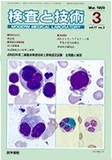Japanese
English
- 有料閲覧
- Abstract 文献概要
先輩技師:これはある学会の抄録集です.英語の勉強のため,この抄録集の中からよい例をいくつか挙げてください.
英文編集者:"An evaluation of the erythrocyte sedimentation rate(ESR)in pregnancy"というタイトルがありますが,これは2か所だけ問題があります.文頭のAnは不必要です.また,略語ESRも要りません.また,"The pathogenesis of UTI-urinary tract infection in vivo and in vitro studies of E. coli and Lactobacillae"というタイトルがあります.Theはとったほうがよく,略語UTIは不必要です,タイトルの中に句読点がありませんが,infectionの後にはコロンをいれたほうがいいでしょう.E. coliはEscherichla coliとフルネームで書かなければなりません.また必ず,動植物などのラテン語名はイタリック体で書くか,またはアンダーラインを付して書くべきです.Lactobacillus,in vivo,in vitroもイタリック体で書いたほうがいいのです.
Senior technologist : This is a collection of abstracts from a congress. Please show us some examples of good titles from the abstracts so that we can study their English.
English editor : One presentation is titled "An evaluation of the erythrocyte sedimentation rate (ESR) in pregnancy." There are only two problems here. The 'an' at the beginning of the title is unnecessary, and the abbreviation 'ESR' does not belong in the title. Another title is "The pathogenesis of UTI-urinary tract infection in vivo and in vitro studies of E. coli and Lactobacillae."① The 'The' should be deleted, and it's not necessary to give the abbreviation 'UTI' in the title. There is no punctuation in this title, but there should be a colon after the word 'infection.' `E. coli' should be written as 'Escherichia coli' in full, and the Latin names of plants, animals, and so on should always be written in italics or with underlining. 'Lactobacillus'②, 'in vivo' and 'in vitro'③ should be written in italics.
Copyright © 1989, Igaku-Shoin Ltd. All rights reserved.


